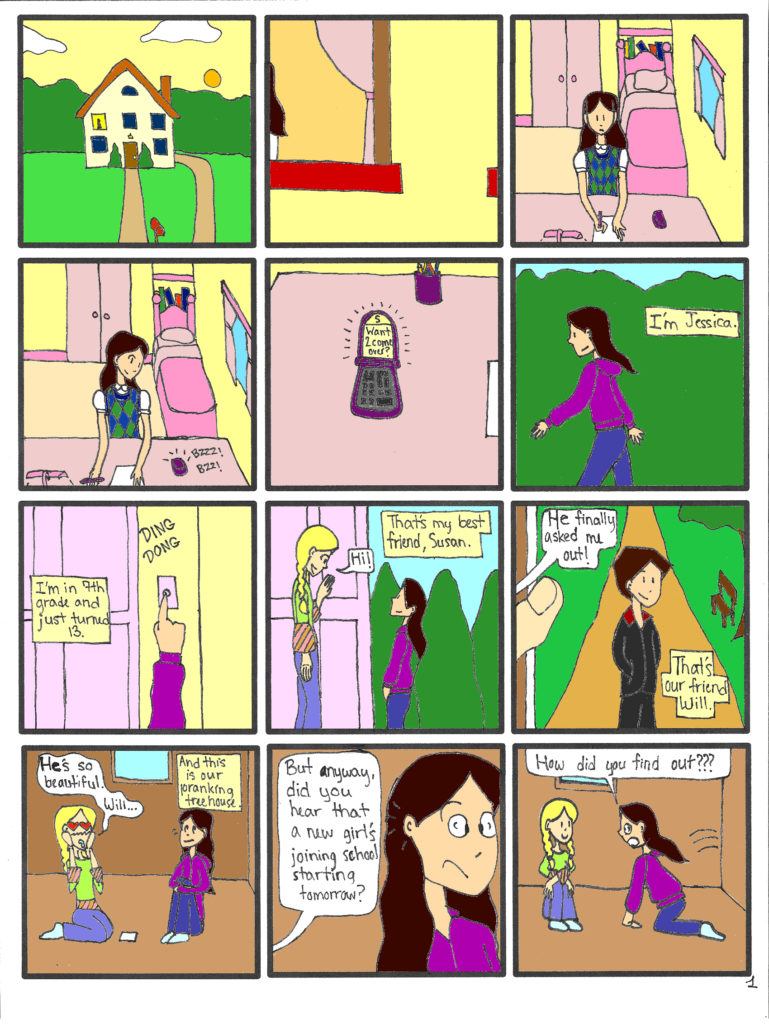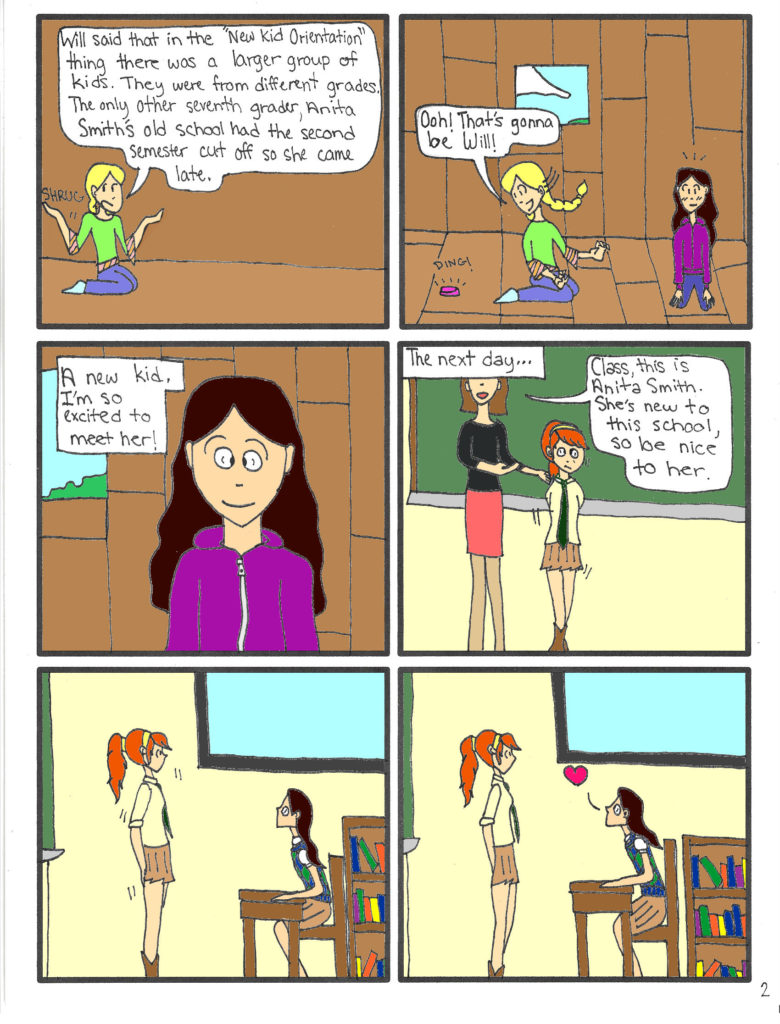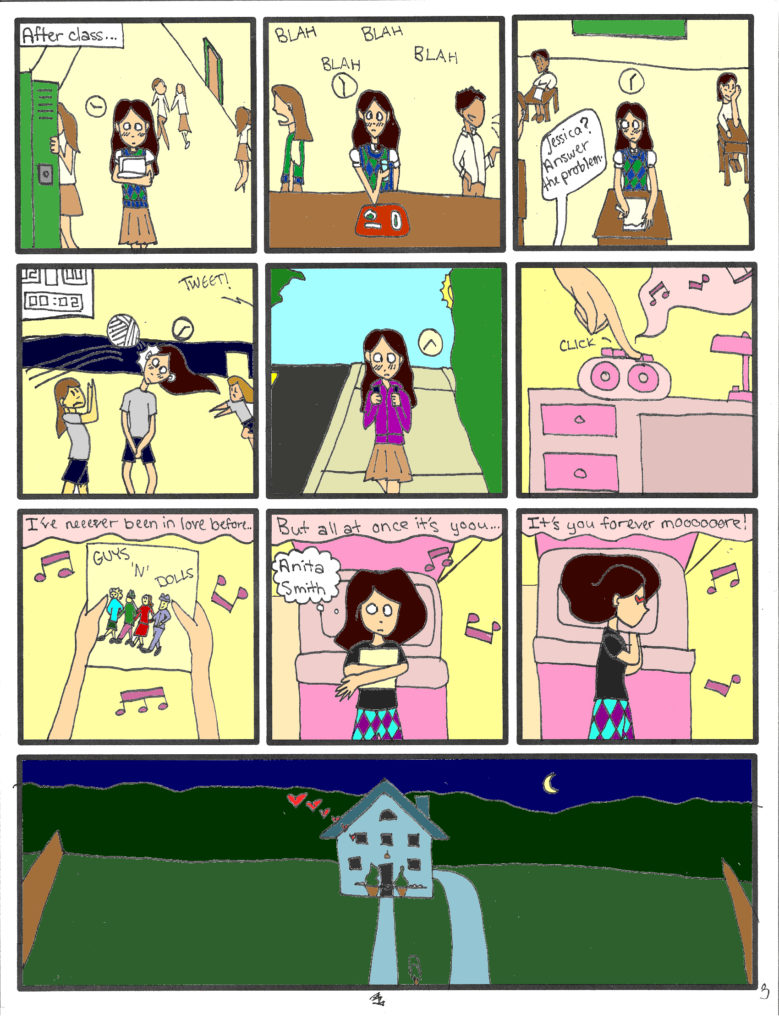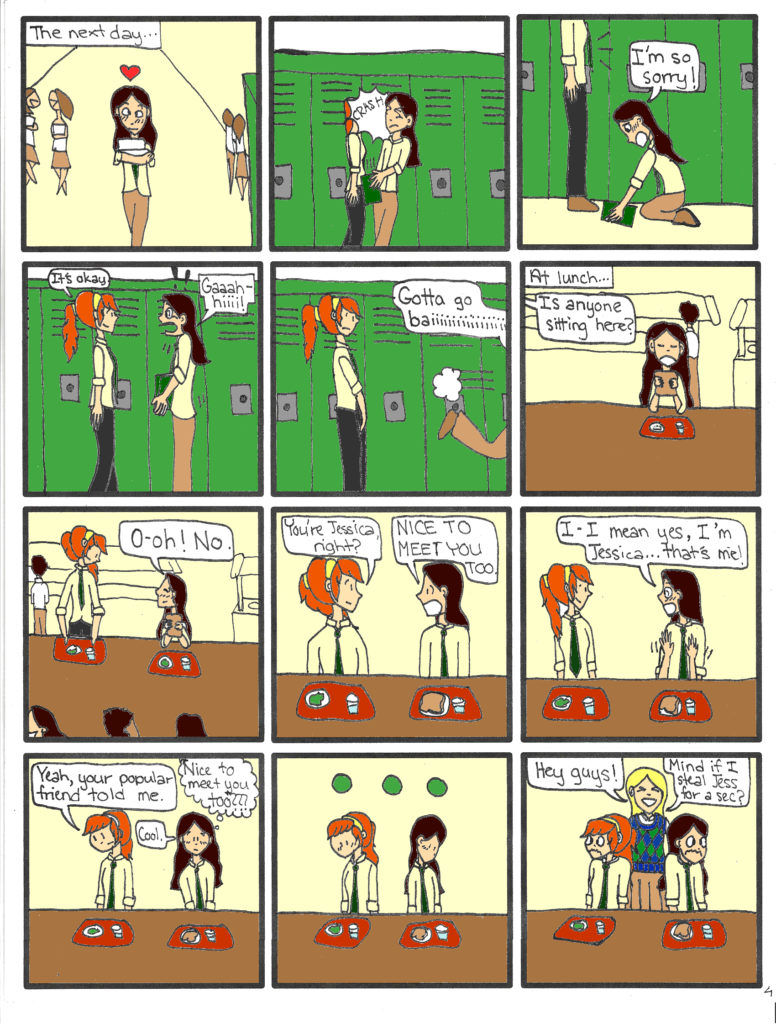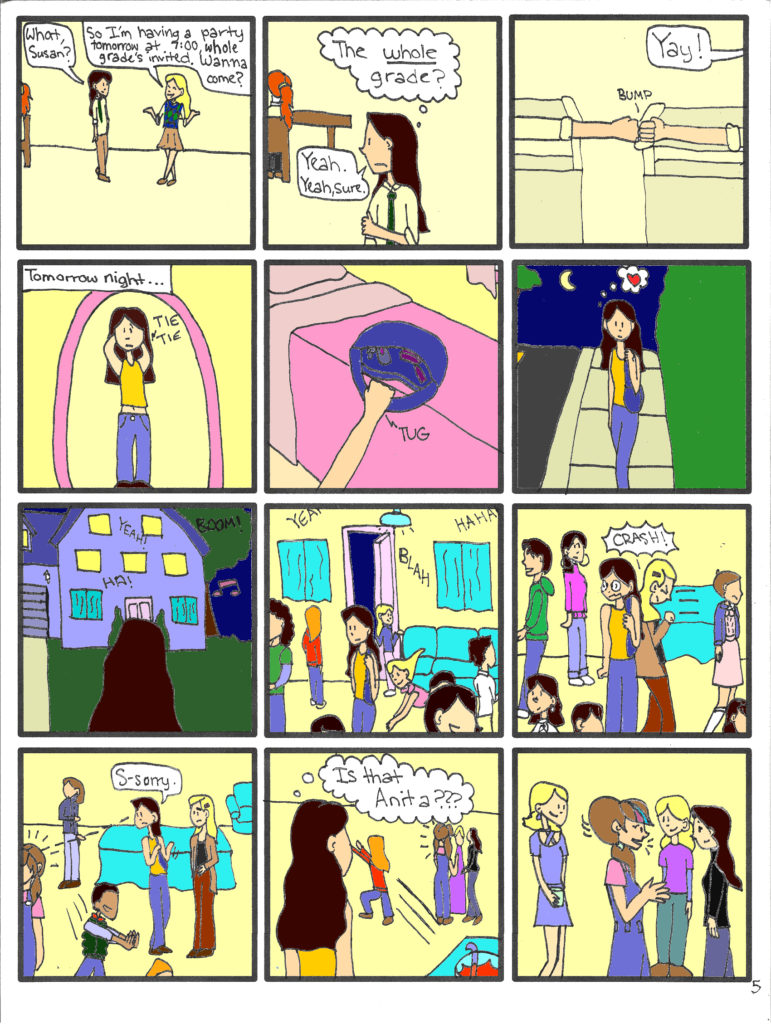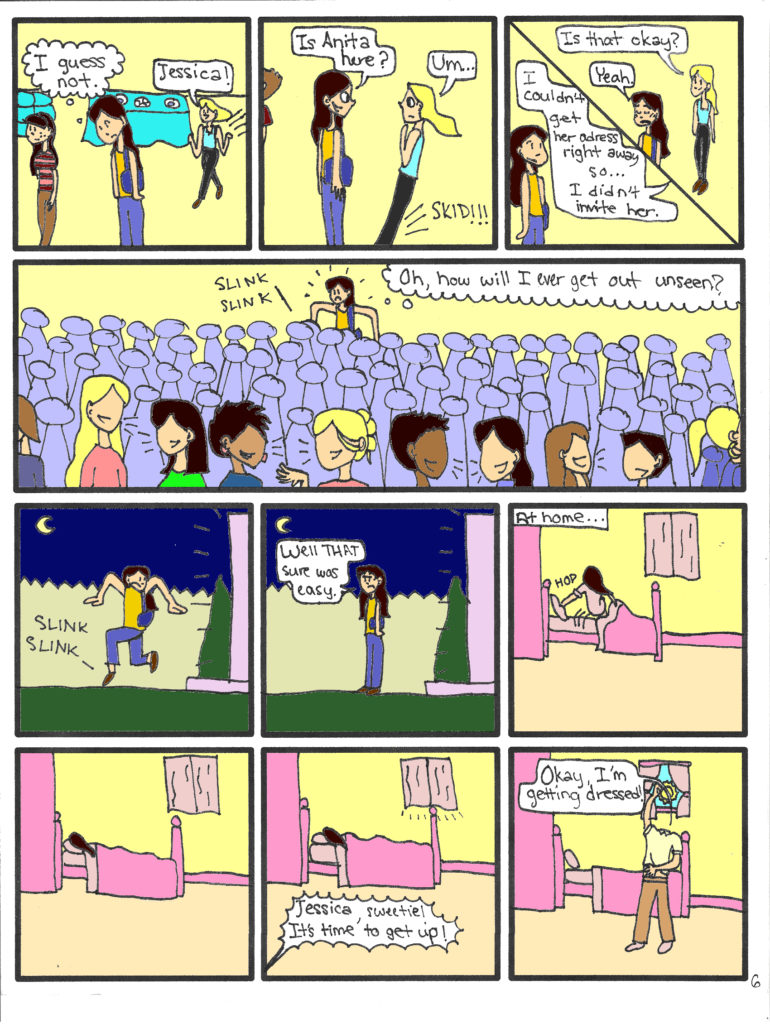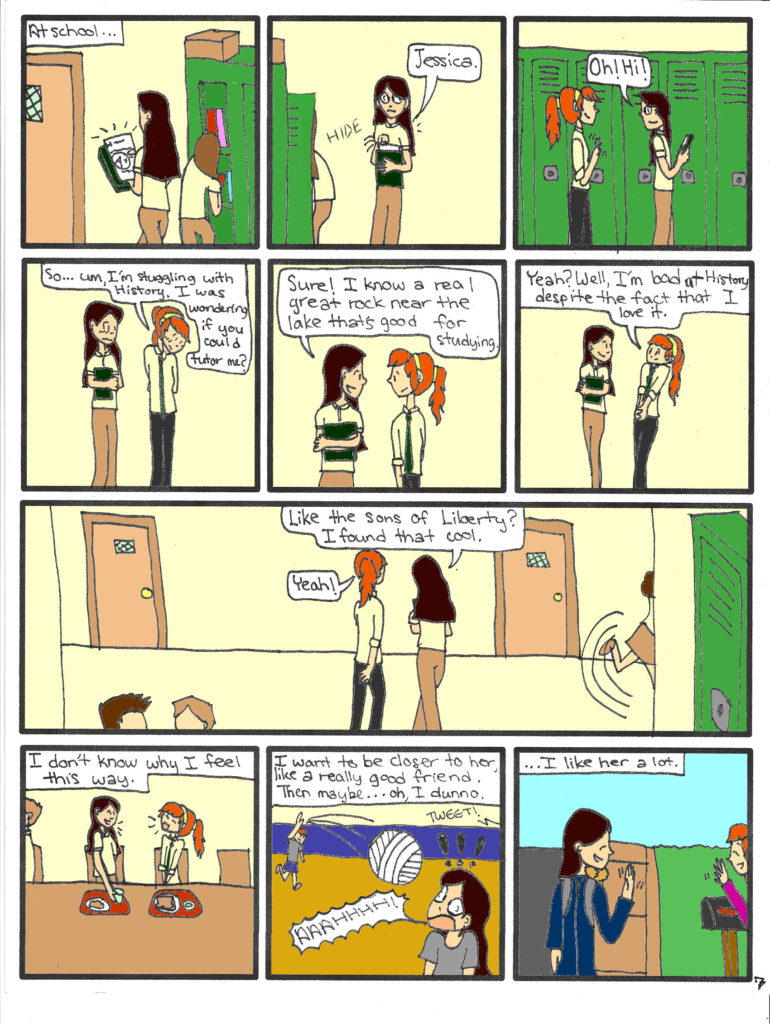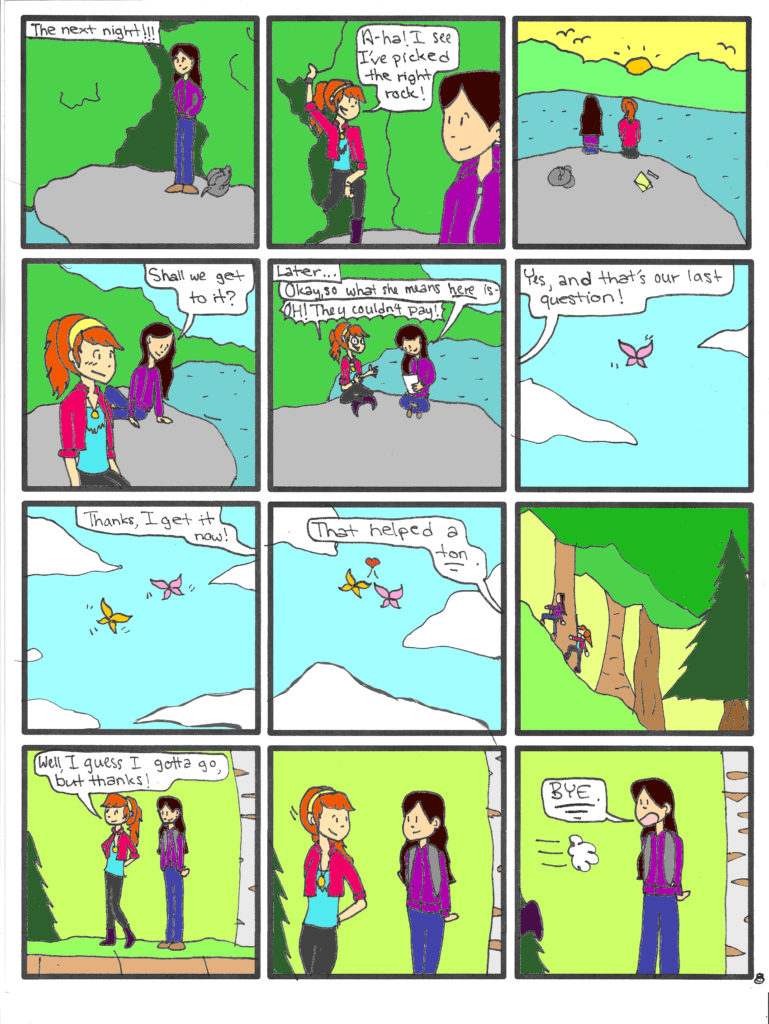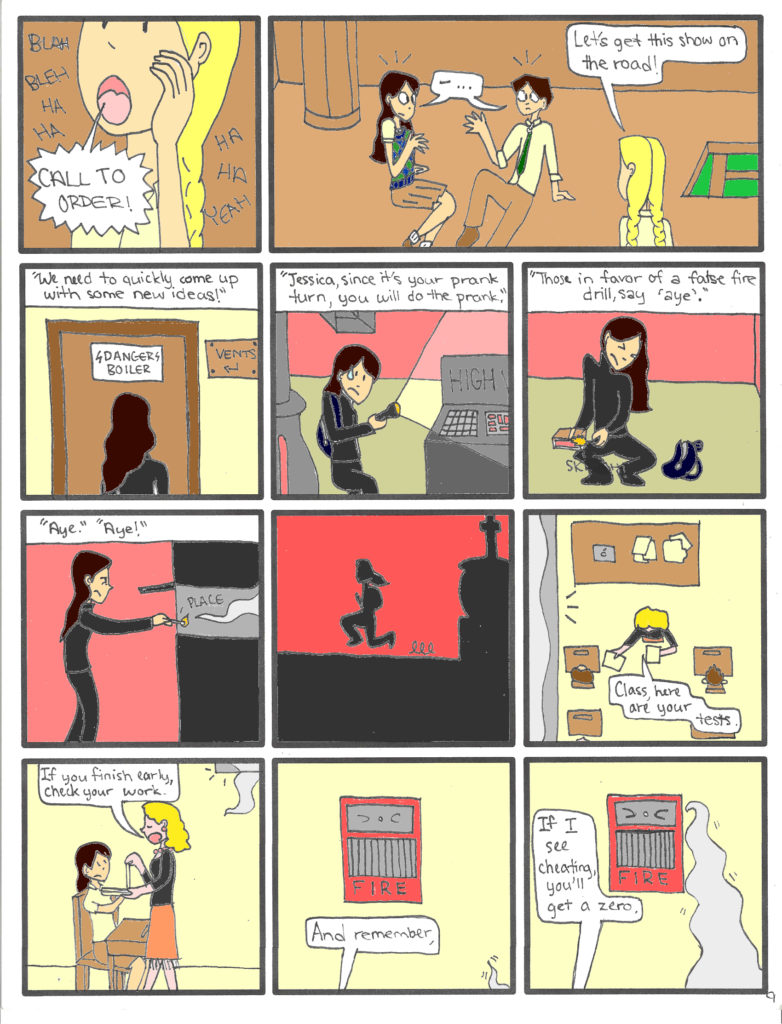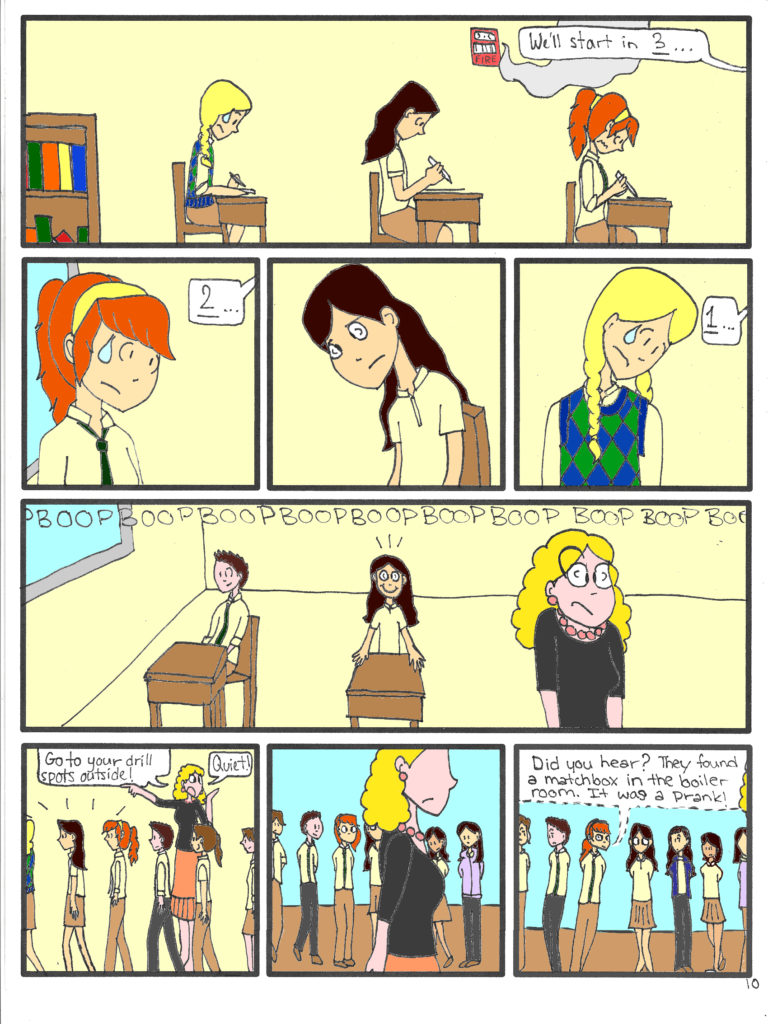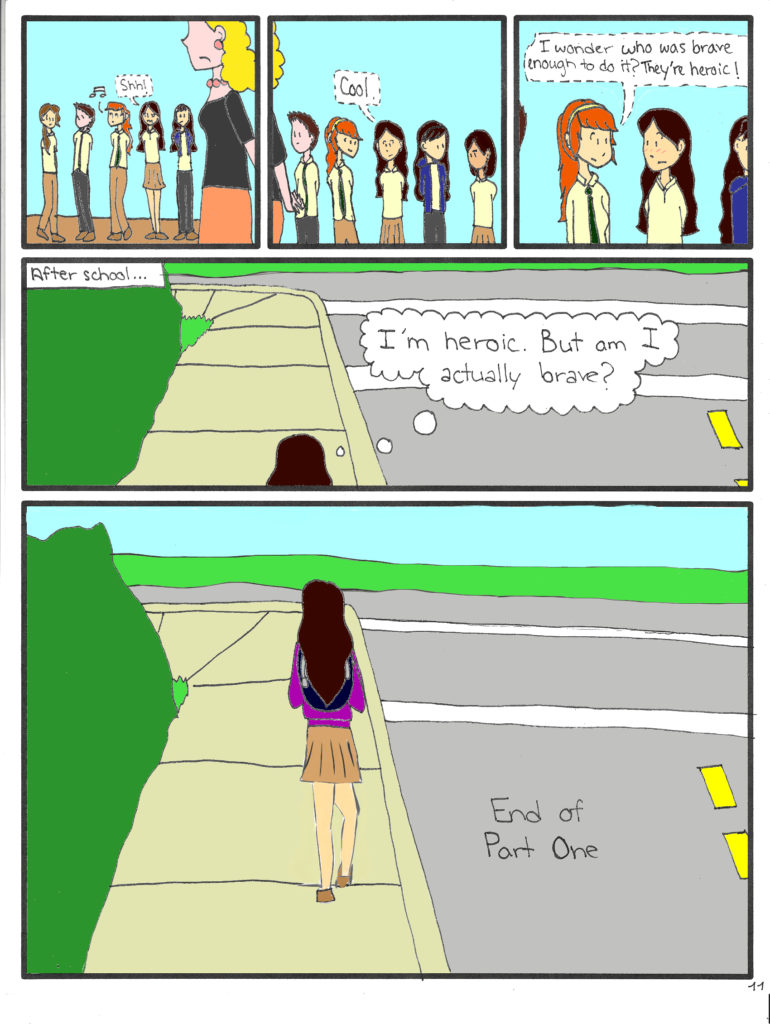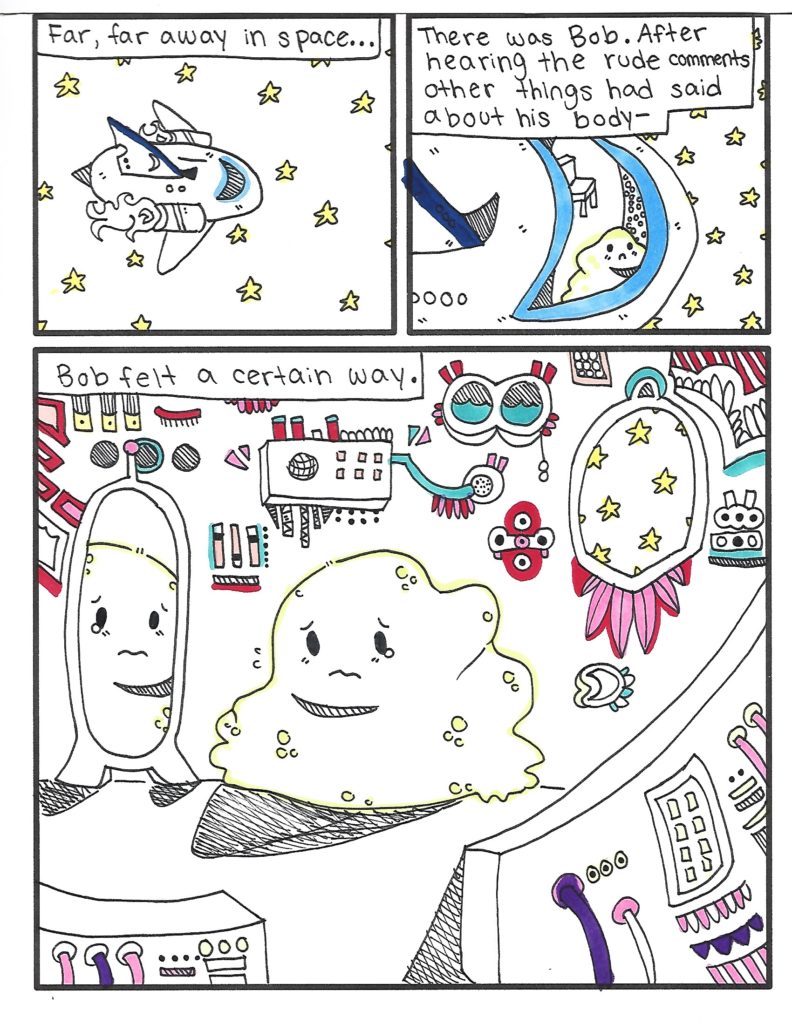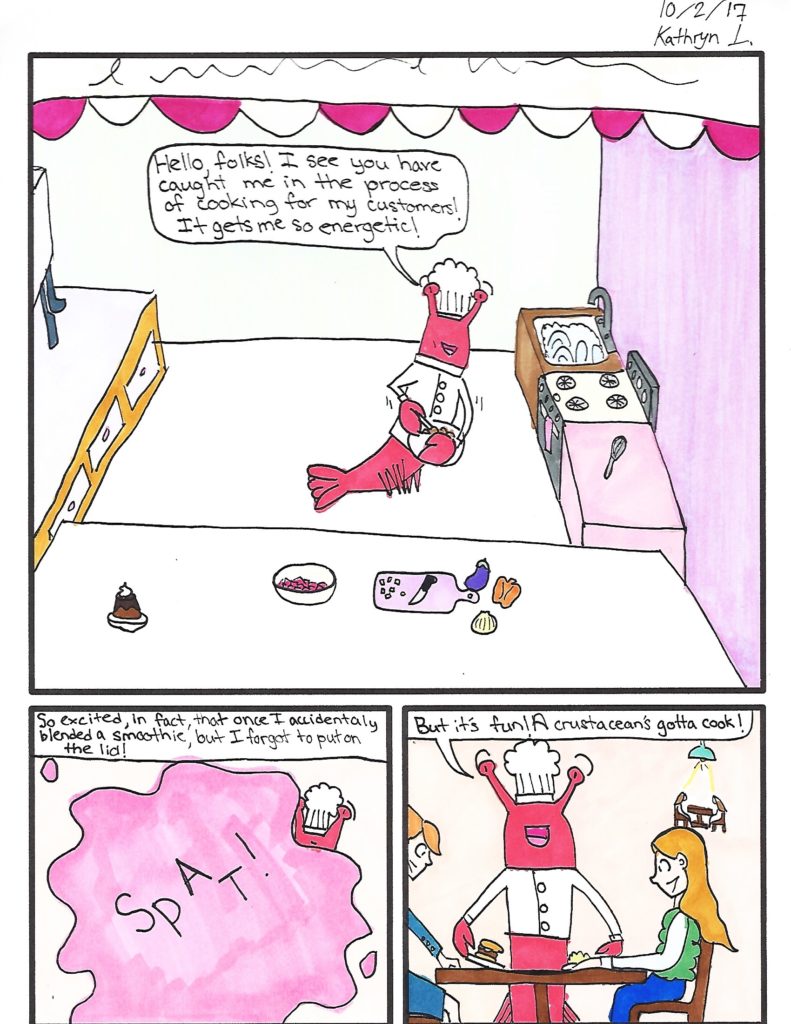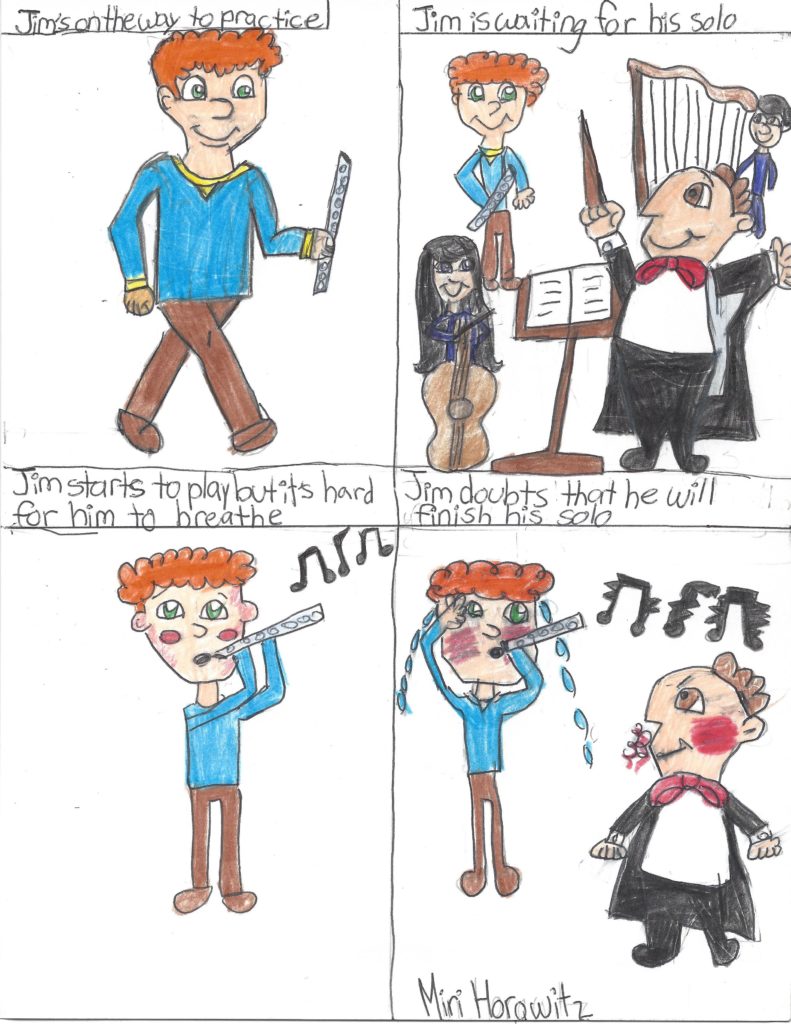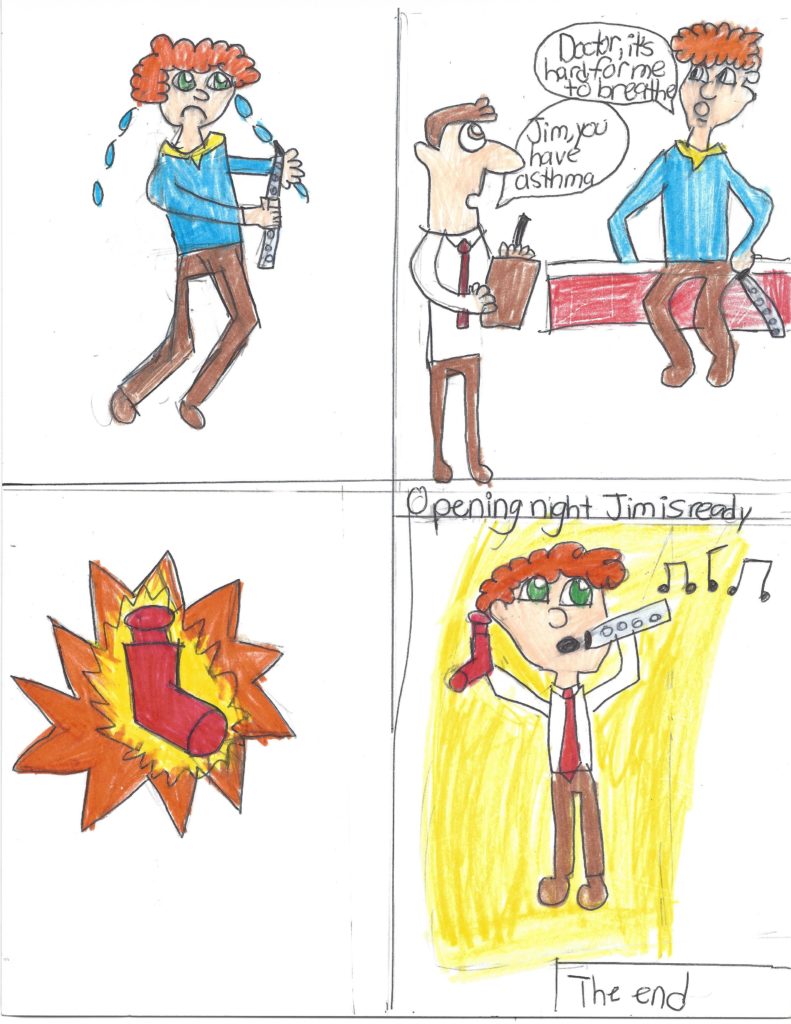“Taz, the psychologist from the adoption agency is here. She’d like to ask you a few questions,” Dad says to me. This happens every year. I run out of my room and into the living room, where I see a tall young woman standing in front of me.
“It’s a pleasure to meet you, Tazu,” she says. I wave shyly in the corner and get out my phone to talk to her.
I am autistic, what most would consider “lower functioning,” and I can’t speak with my mouth parts, so I use a text-to-speech app to communicate. “Pleasure to meet you too. Now what is it that you would like to ask me?”
I pray that even though she now knows I’m non-speaking, she will assume competence and not condescend to me or treat me as subhuman, in a way. That is a stigma that many nonverbal autistics such as I know all too well. That’s why I hate labels like high-functioning and low-functioning: low-functioning means your capabilities are ignored, your humanity brushed aside, and high-functioning means your deficiencies are ignored and you can’t get the support you need; basically either way it sucks, and you often have to go through life alone.
Fortunately, she treats me normally. “All right, first question: are you happy here?” she asks. I nod my head. I am so happy with my dads, though the trauma of my past still haunts me.
“I’m glad to hear that, Tazu. Next question: Do you feel safe here?”
This is a tricky question. It appears to be analyzing two variables: immediate, actual safety and perceived safety. I assume that for this evaluation, what she really wants to know about is actual safety, and I don’t want to give anyone the impression that I feel unsafe with my dads.
I decide to be honest. “To be honest, occasionally not so much. I mean, my dads treat me well and I feel very safe in their care. But sometimes I get these irrational fears that my dads are secretly planning to turn on me. Or that one of them could do… what my mom did to me. But it’s completely unreasonable. I know they would never do that. So yes, I occasionally worry about my safety, but I know those worries are not rational.”
“Thank you for being honest with me. Final question: my results tell me you’ll be able to hold a job someday. Is that something you are considering?”
I frown and hesitate for a second. “I highly doubt I will ever be able to hold down a job. Who would hire an autistic girl who can’t talk?”
I walk out of the room, feeling utterly hopeless. My dad sees me and walks over to check on me. “Hi Taz, you look sad. What happened? Did the evaluator talk about anything upsetting?”
“Yes,” I type. “She thinks I can get a job.”
“I’m sorry, I don’t quite understand why that would upset you.”
“I can’t get a job. No one would hire me.”
“What do you mean?” my dad asks. “You’re smart, funny, and a brilliant writer. I’d hire you.”
I roll my eyes. He just doesn’t get it. According to the latest statistics, 85 percent of autistic adults are unemployed, and for nonverbal people, the statistics are even higher. It is statistically very unlikely that I’d ever be able to hold a job. I’m just thinking realistically and long-term here.
“You KNOW me, Dad. Employers don’t. They’ll just see a weird, too short girl who can’t talk. Autistics don’t get hired.”
“Sure they do,” my dad replies. “What about Einstein? Newton? Dickinson? Heck, there are even rumors of Hitler being autistic, and look how successful he was! I mean, I’m not saying you should become Hitler, but you get the point.”
“First of all, I don’t want to be associated with Hitler. You do know he KILLED autistics along with countless other people, right? Besides, those were the exceptional people. I’m not exceptional.”
Dad giggles. “First of all, I don’t promote Hitler. Second of all, you’re exceptional to me”, Dad replies. “But you’re right. Employers don’t know you like I do. I’ll tell you what. There’s an autism resource fair next Sunday. Why don’t we find out what your options are?”
I sigh. “All right, let’s go. But if I don’t like it, you owe me a trip to the ice cream place.”
Dad laughs. “It’s a deal,” he says.
ONE WEEK LATER
I stare at my reflection in the mirror. A too-short Japanese/Korean-American teen with long wavy hair and wide eyelashes stares back.
Fun fact: 15-20% of autistic people are nonspeaking. Another fun fact: only less than 2% of them get jobs. Final fun fact: I am one of those 15-20%.
It’s really hard to believe, at age sixteen, that I’m still alive. When I was trapped in the misery of my childhood, I never thought I would make it this far. For years I had expected, and later hoped, to die. Then it happened, and for a while I thought I had my wish. But then my dads rescued me and life started to seem worth living.
Could I have actually died, probably? Died briefly and been reborn? Nah, I don’t think being reborn as the exact same person is a thing. When I was a little girl and hospitalized, no one would tell me what was going on. They didn’t think I’d understand, because then I didn’t have any method of communicating.
On to much lighter things! I’m going to an autism resource fair! For a future I thought I’d never survive to see! Wow, I’m really bad at changing the subject. Alright, let’s think about cats. And the color purple. Purple cats?
I put on a purple shirt, one I’ve worn every other day for the past year. Wearing purple makes me happy—so why not be happy every single day?
I brush my teeth and hair, put on deodorant and chapstick. With my poor motor skills, chapstick is about as good as it gets. Best to play it safe.
I’m all ready! I bounce up and down, read a few poems, and play quiet classical music while my dads are still asleep.
Dad drives me to the fair when he wakes up. Dad points to a display board advertising a new initiative called “Hiring Neurodiversity.” “See, Tazu, this agency will help you get hired without an interview!” he says excitedly.
“And how long will that job last once they find out I can’t talk?’
“You don’t know. Don’t assume the worst.”
Just then, a tall, thin man walks up to us. He has blonde hair, hazel eyes, and a big blue “Autism Speaks” t-shirt with a puzzle piece logo.
“Hello, sir,” he says to my dad. “Are you finding any helpful resources?’
“Yep, lots of great information,” Dad replies.
For an alternative definition of great. Most of this stuff is for newly diagnosed toddlers. Do they expect us to magically poof out of existence at age 18?
“I’m so glad to hear that! My name is Jackson and I work for Autism Speaks. We’re working on fundraising and finding a prenatal test and cure for autism. We have a budget chart if you would like to see it. Now who’s this little girl?”
I take a glance at his budget chart. It seems like they make a lot of money, and only 4% of it goes to helping actual autistics. The rest go to research, which I assume means finding a way to wipe us out of the gene pool and preventing us from ever being born. Yeah, so much for Hitler being autistic. Might as well be named Auschwitz for Autism. How is autism “speaking” if you’re trying to eradicate the people who have it in the first place?
“This is my daughter Tazu.”
“How nice! Can she hear us?”
“Yes,” I promptly reply. I am autistic, not deaf.
“Oh, she types. How… nice,” Jackson replies, looking displeased.
“Anyhow, Tazu loves to write,” Dad says.
I share a nature poem I have recently wrote with Jackson.
“You have a very talented child,” he says to Dad. “Autism Speaks is working on an anthology about autism and the strain it has on families. Would she like to write for us?”
Wow. I never dreamed this could happen. Somebody in the real world thinks I’m good and wants to publish my writing. Screw my first assumptions about this group. A eugenicist wouldn’t want to publish my writing. Sure, he has some questionable viewpoints, and he talks about me like I’m not there, but at least he’s offering me opportunities.
“YESYESYESYES!” I type.
Jackson smiles. “A personal story would be great. Something that could reassure and inspire parents of kids with this devastating disorder.”
Wait… parents? Like my mom? I wanted to write for fellow autistic people, not the people who did what they did to me… this isn’t… this doesn’t really…
“She’s tired, isn’t she? I’ll send you an info packet about our next autism support meeting. I think it would be helpful for you both, especially Tazu who needs to understand what parents go through. It’s so hard when your child lacks empathy and love is a one-way street, isn’t it?”
Wow. Now I REALLY hate him. I try to forget and instead see this as an opportunity to share my voice and combat what seems to be the COMPLETE LACK of actual autistic input in this organization.
A bit later, Dad drives me to the ice cream place as he promised. “Whew, that was HOT!” he comments. “And the drive here was so long! I’m all worn out for the day.”
“We would have gotten here sooner if you didn’t blab on to EVERY SINGLE PERSON YOU MET,” I type. “You’re like a dog sniffing the butts of other dogs.”
I smile. It doesn’t matter that the fair was hot and boring. It doesn’t matter how hurt I was by Jackson wanting to “cure” me of who I am. None of that matters. Because publish publish PUBLISH!
I turn to my dad for a second. “It’s just—it was a little strange how that man was talking to you about me when I was right there. Also how he’s all into cure and prevention and stuff.”
“Yeah, I didn’t love that either,” he replies. It just felt a bit off.”
“But it’s not important. More important is that I COULD GET FLIPPING PUBLISHED!”
Dad smiles. “I’m so happy for you too! But to be honest, the way that man talked worried me a bit. Like he didn’t see you as a full person. Are you sure you’ll be okay?”
“I think I can handle it.” I reply.
“That’s good.” Dad checks his phone. “Hey, I just got an email from Jackson about the autism group. It’s in two weeks. Do you want to come?”
“Sure,” I say. “I’ve always wanted to meet some more of my fellow Autistics.”
…..
I pace back and forth, the light shining brightly in my room. I can’t believe I’m going to an autism support group later today. What if they don’t like me? What if they want to get rid of me? But what if they’re really nice? I don’t want to miss out on a great opportunity!
It is 4:30 in the morning. I get up and wake my other dad up, whom I call Pop.
“Hi Taz! You’re up early. What’s up?’
“Hi, soft drink,” I playfully type.
“No, I’m Pop!”
“Hi, champagne. Icky!”
“Your dad and I love that you hate the taste of alcohol.”
“No, icky you!”
“Careful, Taz. Insult me too much and I’ll have to disown you!’
My smile fades. The flashbacks from my old past come flurrying into my head, no matter how many times I try to get them out.
“Oh no, Tazu, not for real…” Pop says. “I only meant to tease you like you teased me. Not make you sad. I would never really… do that. Other teens say ‘I hate you’ to their dads. If ‘icky’ is the worst thing you call me, I think I’m good. Plus… you’ve smelled me after going to the gym. Given how stinky I get, I’m lucky YOU still love ME!”
I hug Pop tightly. Of course I will always love my crazy old Pop.
I fall back asleep. At a fairly more reasonable time in the morning, I do my daily routine and prepare for the group.
I walk into a large penthouse, filled with mostly adult parents who as far as I can tell are not autistic. Most don’t have kids with them. Some wear blue puzzle-piece t-shirts with slogans like “AUTISM SPEAKS: IT”S TIME TO LISTEN” and “MY CHILD IS PART OF THE EPIDEMIC BUT THE EPIDEMIC IS NOT PART OF MY CHILD!” I only see one kid, a blonde-haired little girl.
“Ouch! Daddy, get it out! It hurts, it hurts!” the girl screams.
“Cassandra, just suck it up. It’s just a tag. Don’t bother me,” her dad says. He’s wearing a shirt that says “VAXXED: SOUNDING THE ALARM FOR MY VACCINE INJURED CHILD.” I know how uncomfortable tags scratching against my back can feel. Non-autistics don’t seem to notice, but my dads have always been sensitive. I’d offer to help, but I don’t want to make a bad impression on the group. A young teenager, wearing a sweatshirt that says “Autistic pride worldwide,” escorts the girl to a small room, where I see a bunch of other kids.
Then, the support group starts, and I follow Dad to the group.
“This group has been lifesaving for me,” the orange-haired mother of the young teenager exclaims with a smile. ‘It’s been a bit tough ever since my daughter first told me she might be autistic. She discovered it through Tumblr or something. We always thought of her as shy, introverted, maybe even a genius. We denied her diagnosis for a while, but she persisted! Now we’re looking for a professional evaluation.”
Another mom speaks up. “How wonderful! We’ve been helping prepare my son for adulthood. Just found out he has moderate to severe developmental delays in regards to self-care. I hadn’t noticed. I love this group too, though the negativity can sometimes overwhelm me, if I’m being honest.”
“I agree. So much focus on the cure and the missing piece of the puzzle. If you asked my daughter, she’d tell you that her autism is a culture, and only a disability because of society.”
My first impression was completely wrong. These supportive parents, listening to their children and their views on being autistic.
“We, um, appreciate your concerns,” Jackson replies. “However, our group is based in Autism Speaks’ mission statement, which is to find treatment, prevention and a possible cure for autism. Also, autism can be soul-crushingly devastating at times, and it’s important not to whitewash it. However, we understand how it is so easy for those of us with… higher-functioning kiddos to forget what it’s like for other parents.”
“Oh, yes, I suppose that’s true,” the second mother says. “Anyways, our son just had a neuropsych and was diagnosed with moderate to severe developmental delays. His motor skills… his disorganization… his ability to do chores… I always thought that he just couldn’t care less about learning to drive, but now there are cognitive problems holding him back!”
I consider this for a moment, then type to give my insights. “Well, when you’re autistic, development is not linear. For example, some people think I can’t understand them because of my ability to speak.” I glance at Jackson for a second giving him an evil eye. “But I’m rather deep thinker and have good cognitive abilities. Dad has tried teaching me how to drive a car, and it usually ends in confusion and sensory overload. So a smart boy who struggles with household tasks is totally normal for autism.”
The two parents nod appreciatively, while the other parents in the group scoff at me. One man turns to his wife and whispers “I don’t believe she really has severe autism. She’s nothing like my child.”
“Tazu, you’re here to listen, not comment,” Jackson scoffs, then turns to the group and says “self-absorption is a symptom of autism. This is why we must fundraise for a cure.”
“Anyways, how have everyone’s weeks been?” Jackson redirects the conversation.
“Mine was awesome! My daughter said her first word! Just like a normal child,” one dad says.
“That’s great!” Jackson replies. “She is on her way to functioning like a child without autism.”
“Horrible. Cassandra made another mess. Paints all over,” the dad of the little girl with the itchy tag says.
“My daughter used to do that. She said she was going to be an artist. I just told her that if she makes a mess, she cleans it up! I had the most lovely artwork, though,” the mother of the teen girl says.
“Well, you have a very high functioning daughter,” Cassandra’s dad says. “Cassandra’s results could never be called art. It’s just a mess. Cassandra is low functioning. She’ll never fit into society. We’ve been implementing behavioral interventions but I really don’t see the benefits. All the shrieking! And the bizarre motions with her hands! At this point, sure, I don’t expect total compliance, but at this point I’m fed up. This intensive therapy is just not working. I want my money back.” He sighs. “All this because of a measles vaccine.”
I shudder. Intensive therapy….
Four years ago….
Torture. Torment. Terror. Treachery. Nope, when you’re autistic, it’s just treatment. And that’s what I was subjected to, for forty hours a week. A therapist would come over and do drills with me, 6 hours a day, every day. “Touch green.” “Look at me.” “Say ‘I love you’ now.” “Good girl.” “Do what I say or you’re a bad girl.” “Let’s see if you’ll behave.”
I didn’t know it then, but there was a word for this: ABA-based behavioral therapy, with aversives, the only scientifically proven treatment for kids like me.
“You need to look at me, Tazu,” the tall, intimidating, slightly overweight therapist Becca, says. Oh no, not this again, I can’t do it. It hurts too much.
“Do as I say or you’re a bad girl.”
I immediately look up. It immediately sends my thoughts scattered in a million directions, and it’s almost as if she can read into my soul. My eyes start watering and burning and I can hardly focus. Spears of hot pain rush through my eyes and and and
I look away and start rocking back and forth to calm myself.
“BAD GIRL!” Becca yells at me, and spanks me. She reaches for her bottle and sprays vinegar into my mouth. I am miserable, but I can’t resist. Being a “bad girl” will only make it worse.
…..
Intensive therapy. Behavioral intervention. Total compliance.
That’s what Cassandra’s dad wants done to her. The same kind of nightmare I lived. I wouldn’t wish it on anyone.
I can hear Dad’s voice. “Tazu! Tazu, look at me!”
“EYE!” I shout. “No eyes,” Dad says. “No eye contact. Just Dad. You’re with me now. You’re safe.” I hug him tightly. He’s right. Aversive therapy is in the past. If a therapist ever hurt me, my dads would fire them. No more forced eye contact. No more punishments. I’m safe.
“Can you smell my shampoo?” Dad asks.
I reach for my phone. “I also smell your B.O,” I type.
I hear the voice of the orange-haired mother. “Maybe you guys would like to step out, go to the kids’ room for a minute?”
“I’m fine,” I say. “Jackson said I’m supposed to be, um, learning what parents go through. I can’t do that in the kids’ room.”
I begin rocking back and forth to put out the internal fire happening in my head.
“That’s the same thing that Cassandra does! Her father lets her do it in public? Negligent! She’ll never go anywhere if she acts this strangely,” Cassandra’s dad says.
Dad sighs. “Tazu, you might not need a break, but I definitely do. Will you come with me?”
I nod and follow him to the kids’ room. I can hear Cassandra’s dad in the background. “I don’t know how that man puts up with that daughter,” he says. “If I had a child who didn’t talk and acted like that…”
“That went much worse than I was expecting,” Dad says. “Some of those parents were so judgmental about their kids. I’m so sorry I exposed you to that.”
Just then, the young teenager with the “Autistic Pride” shirt comes up to me. “My name is Stella. What’s your name?”
I reach for my keyboard. “My name is Tazu. I’m 16 years old.”
“Really?” she asks. “You’re so small! I read that anxiety can cause stunted growth in girls. That study wasn’t specific though. It only said ‘girls.’ Like do trans girls count? What about trans guys and non-binary folks? Is it based on gender identity or sex assigned at birth? They really should have specified.”
“Yeah, they should have,” I agree. As a pansexual cis girl, I also dislike cisnormativity.
“Yeah,” Stella says. “Wait, what were we talking about before?”
“We were discussing the mystery of why I am tiny,” I type.
“Well whatever you are, tiny is cute!”
I blush. “Thank you,” I reply.
And then a little girl gallops into the room. She has messy blonde hair and blue eyes. She looks about 7 years old, 8 maybe. “I’m Cassandra! Or Casey if you forget.”
“Nice to meet you! This is Tazu, and I’m her dad,” Dad says.
Casey wiggles anxiously. “Are you friends with my dad?”
Not in a million years, Dad silently mouths to me. “No.”
Casey relaxes. “Why didn’t you stop Tazu from wiggling?”
“Because I think people can wiggle if they want to,” says Dad.
“Wow,” Casey says admiringly. “You’re awesome. Tazu, I got an idea. Can you abobt me too?”
“Do you mean ADOPT you?” Dad says.
“Yeah! Dad wouldn’t mind. He wants to send me away. He thinks I’m annoying. He thinks I’m, um, hurt by a vaccine or something.”
Just then, her dad comes in. “Cassandra! There you are! Sorry about my daughter. She has no sense of boundaries.”
“Oh, okay. Well, see you next week for the next meeting?” Casey asks.
Yes, it was a bad meeting. Yes, it triggered me. But I can’t help myself. This little girl, mistreated by her father… I can almost see my past self in her.
“Of course I will see you next week,” I say. “We are friends now.”
DAD POV
Casey reluctantly trudges back to her dad’s car as I stare in shock.
Tazu just agreed to go to another meeting.
To return to the place that set her off.
To expose herself to people who could remind her of her past.
How can I protect her? How can I protect her from the PTSD, the nightmares, the distrust of anyone around her?
It took so long to get her to trust us. I don’t want to risk that progress. I take a deep breath. Maybe I’m just being an overprotective father. “Tazu, I get that you feel bad for Casey, but I want you to think about yourself too. You screamed at that meeting. It looked like you had a flashback.”
Tazu nods her head. She gets it.
TAZU POV
“I understand,” I type. “Casey’s dad is a jerk, so is that other man, and Jackson didn’t stop them. Plus the fact he thinks autism was caused by vaccines—if I ran a group that alone would be a reason to expel someone. But that’s why we SHOULD be there. To give that girl a bit of light in her life.”
This is a dilemma. A conundrum.
I like that word, conundrum. If I could talk, which I can’t, I would say the word out loud over and over, just to taste the crispiness of it.
Jackson walks over. “Hello! Now I know Tazu had unreasonable behavior at the meeting, but I hope she’ll come to next week’s. It’s good for her to think about her audience and not let her low-functioning autism get in the way.”
I nod. This seems to make Jackson happy.
Just then, Stella’s mom enters the room. “So sorry about that meeting,” she says. “That man has an attitude problem. Do you want to come to the beach with us? We’ll be talking about boring grownup stuff like mortgages and parenting, but our daughter Stella will be there.”
I nod.
I am at the beach with Stella and her best friend, Jeffery, who is also autistic. We have a nice conversation about art, the world, movies, and cat videos, which Stella loves.
Stella and Jeffery are very cute. Especially—especially Stella. I have been noticing… things. “Are you a couple?” I ask. They both start laughing maniacally. “Boys aren’t my type,” Stella says. “And gay girls aren’t my type,” says Jeffery. “We’re best friends.”
I switch the subject, embarrassed. “Anyways, Jackson from Autism Speaks asked me to contribute an essay—”
Stella and Jeffery exchange a concerned glance at each other.
Later, I work up the nerve to ask Stella out. A grin spreads across her face and she starts rocking excitedly. I assume that’s a yes. A big silence surrounds us until she finally says “I could tell when I first met you that you… swing that way. I may be socially delayed, but I have a very fine-tuned gaydar.”
I laugh.
A few days later:
Me and Pop walk into a large office, with blue puzzle pieces all over it. Jackson is right there, wanting to discuss my opportunities.
“I’m so glad you guys could make it here,” he says. We discuss the essay. I’m getting paid a lot! “Besides the essay, I’d like to offer you two amazing opportunities. One, my coworker is making a documentary about autism and its effect on families. She invited you to speak for it. Two, a reality TV show would like to interview you.”
“YES YES YES YES YES!” I type. I’m going to be TV famous! Hooray!
“Glad to hear it,” Jackson says. “Your name will bring us so much publicity.”
TO BE CONTINUED…
Hi guys, thanks for reading! I wanted to include a little guide for how to best interact with autistics. Yes, I am Autistic myself, though verbal.
- Respectful language: Most autistic people prefer using “identity first” language (“autistic people” or “autistics”), rather than “people with autism.” This is because autism is integral to our identities and isn’t a disease that can be separate from us. As well, we prefer not to use terms like “suffering” or “struggling” with autism because it’s just who we are, not a burden. As you read the story, pay attention to who uses what language.
- Charities: Organizations like Autism Speaks have been criticized for lack of autistic input and negativity. Instead, support organizations like the Autistic Self Advocacy Network, the National Autistic Society, or the Autism Women’s And Nonbinary Network. Some red flags for a bad charity are: the use of puzzle pieces or the color blue, promotion of a cure, lack of autistic board members, and promotion of abusive or damaging “autism conversion therapies” such as the behavioral treatment Tazu was subjected to. In part two, you will see an example of a good charity.
- Help us out socially, but respect our boundaries and don’t force us to socialize. (Yes, disabled people have boundaries too).
- Let us flap, bounce, rock, etc. This is called stimming and it is actually organizing for autistic brains. As well, don’t force us to make eye contact.
- Eliminate the word “retarded” from your vocabulary and don’t use “autistic” as an insult.
- Always assume that we’re capable: If someone can’t speak, talk to them anyway. Chances are, they’re just as bright as Tazu.
- Amplify the voices of actual autistic people.
My Silent Resistance PART 2:
Pop takes me to a small office to be interviewed for the documentary. I’m so excited! Ready to change the world, influence the national conversation about autism, spread the word to make sure that what happened to me and the abuse Casey is living through doesn’t happen again. I want to save all my fellow autistics, or at least make a difference to some of them. I know it can’t happen in a day, but at least this interview is a good step. It’s support group day today, and I’m thrilled about missing this one, though I was hoping to see Casey again. Jackson gives me a blue puzzle piece shirt to borrow for the interview.
I wait for what feels like an hour, maybe two. I’m so bored! I hide behind a plant and rub my hands against it. I throw off the Autism Speaks shirt. Writing for this company is okay, but I don’t think it quite deserves me publicly advertising it. Just then, a young woman, wearing an Autism Speaks shirt, walks up to me. “Hello, Tazu,” she says in a coo-like voice, as if she’s talking to a puppy. “Do you mind if I ask you a few questions?”
“Sure, ask away,” I say.
“When did you learn that you had autism?” she asks.
“Um, I kinda always knew. I mean, it was kinda obvious. My parents thought I couldn’t hear them, so they talked about it all the time in front of me and how much of a burden it was. They whispered ‘autism’ like it was a dirty word. I was diagnosed early, I think?”
“And how do your parents feel about it?” she asks.
Dads. Focus on dads. “My dads love me for my true authentic autistic self. They try to accommodate me the best as possible. They take me to respectful therapies that don’t try to change who I am, but make my life easier as an autistic person. The therapies they take me to help maximize me rather than normalize me. Trauma and fear still get in the way sometimes, and I still have occasional meltdowns, but with their support and love, I’ve grown into a somewhat well-accomplished autistic person.”
Not well-accomplished enough to be able to hold a job outside of an autism organization, though, or even hold myself together in a job that is in one. Not well-accomplished enough to get over the fear, the pain, the flashbacks, the inner ghosts from my old life.
I sigh. Probably won’t share that with the interviewer. The stereotype is that autistic people have no feelings besides desperation and self-hatred, and I don’t want to give way to that stereotype.
“Um, we use Person First language here. You’re not ‘autistic’, you’re a person WITH autism. Anyways… what about your REAL parents?”
My… “real” parents….
When I was little, my parents never bothered to teach me to communicate. I was always trying to please them, but it never worked. They never talked to me, but in my dealings with them (or perhaps as they would put it, their dealings with me) I discovered three things.
1. That my parents didn’t like me. They spoke of having another child, a “normal” one, to alleviate their suffering, but also expressed concern that the next kid would also “turn out wrong” (i.e, autistic.) When they did have another kid, they quickly changed their mind and aborted the baby because “imagine how hard her life would be, growing up with a sister like that!” Whether I got a sibling or not, the point was this: In their eyes, I was a Worst-Case-Scenario, a Tragic Outcome, a Defective Factory Product, a baby they’d have aborted if they only knew what it would become. I was a failure.
2. The reason why I was a Failure, a Not-Quite-Human-Person, and not “normal” like the people I looked up to, was because I “had autism.” No one ever talked directly to me about this (“she’s too incompetent to understand her affliction”) but my parents spit it out in front of me like it was a dirty word.
“All this because of.. autism.”
“You really should go easier on Tazu. Her defectivity, her…. autism.. she’s not the one who cursed us with it. It was Jesus. Jesus Christ wronged us and made our life hell… made our daughter hell.”
“Autism prevents my daughter from ever being fully lovable and us from ever gaining our sanity. Why do all these self-righteous social justice warriors tell us it’s a gift, a ‘neurodiversity’, a hidden joy? There is no joy in this child.”
“I want out of this… autism. I want out of this monster. I want out of this child”.
I never really knew what “autism” meant, but all I knew was that I had it, it was a monster, and therefore I was a monster, could never be lovable, was a curse from Jesus. When I really came to understand myself was when I later discovered the autistic community online, who were probably the “self-righteous social justice warriors” my parents tried to shield me from. Before I met them I saw the world in two groups: Failures and Normals. When I found this community, my world was changed- more than changed. A whole new world, populated by people like me. (Some of them also said that Autism Speaks was a hate group, and I’m starting to see that from my time here, but… who cares? Probably just a vocal minority). To my parents however, autism was far from a culture. I learned that if I stopped having autism, Mommy and Daddy would like me, and I’d stop being a Failure. I’d become a sacred Normal, like Mommy and Daddy and Becca were.
3. Because I had autism and was a Failure, I was never safe. Therapists would scream and pin me down and lock me in the dark, all in the name of compliance training, applied behavior analysis (ABA), hard work, “tough love.” People say ABA is like dog training for kids… I couldn’t disagree more. No reasonable dog trainer would treat a dog that way. My mom tortured me too at the therapist’s recommendation. My dad was the more sympathetic one. He was the one who made the comment about autism not being my fault but being Jesus’s fault instead when my mom yelled about how much I had robbed her of. (He was a very devout Christian who also happened to believe being gay was a sin). He was the one who called the police when it happened so I wouldn’t die. He didn’t hurt me or anything, didn’t abuse me, didn’t hit or punish me. He always said “I love the child but hate the autism” while my mom was more like “hate the child because of the autism.” But for all the abuse it caused me, being on the spectrum with parents like mine gave me a unique (dis)advantage.
Non-autistics are always so discreet. There’s a meme I saw on the Internet: a smiling zombie going look at me I’m a neurotypical, I give weird hints about things instead of just telling people! So much confusion, so much fuss over not being rude or offending people, and it’s like, just tell me already! But because my parents assumed I couldn’t understand them, and they hated me so much that they had every intention of being rude to me, they said exactly what they thought of me right to my face. They gave me suggestions for how to make them like me, and I didn’t even have to ask: don’t be so loud, stop those bizarre motions with your hands, start speaking, make eye contact. Because of this direct advice, I lived to appease them: but it never worked.
My.. real parents….
I want to speak. About my experiences with abuse and self-hatred, about the trauma that came along with living with parents who hated me and my brain, even about it. But something in this woman tells me it’s not safe. I want to speak so badly. Want to resist, but I can only resist through actions, not words. And if my resistance is silent, it’s pretty much useless, right?
I kick my leg up. “NOOOOOO!” I scream. The fire starts up in my brain again. I’m so ashamed. I’m having a meltdown—on live TV!
I can hear the interviewer saying “Defiance is a symptom of autism. Individuals afflicted with the condition may have tantrums for no reason. You can see how this must feel for parents.”
How this must feel for parents…. how would my mom feel?
i hate her i hate her she’s ruining my life
gotta get rid of her we must get rid of her now
burden strain crisis epidemic
I start crying, then bang my head against the wall as hard as I can to make the pain more physical than emotional (in the background, the interviewer says, “self-injurious behavior is a symptom of autism”). I type “TURN OFF CAMERAS” mid-meltdown, but she doesn’t listen.
I’ve just proven myself unworthy of dignity. The public is going to see my meltdown and think that’s what autistics look like, all we’re capable of. I’ve let down the community I promised to serve.
To avoid further humiliation, I dash out of the building. (I’m preparing for the interviewer to say, “elopement is a symptom of autism” any minute now.) I text Pop to come get me, and tell him about the interview and what a disaster it was. He texts back, “I’m sorry to hear about what a PITA that woman was. Can you hold on for a few minutes? Still at the support group. Parents are being PITAs there too. I was just about to call them out on it and give an angry speech on how au-some we are before you texted!” (PITA is text talk for pain in the ass). He texts again, “Love you my fellow Autie. Stay strong. I should be there in another hour or so.” (Pop is also on the spectrum, though verbal and neurotypical-passing).
“See you in an hour, champaign!” I text back, completely recovered from the meltdown.
That gives me an hour to hang out with Jeffrey and Stella. I text them and they meet me next to the Autism Speaks building.
I tell them about the interview, how annoying that woman was, how she publicly humiliated me and it’s going on a documentary. “Utterly disgusting,” Stella types. “Has she ever even met an autistic person, or is she just going off Autism Doesn’t Speak For Sh*t and a whiny parents complaining group chat?”
We all laugh.
I start questioning myself. This is the only organization that’s been actively criticized by the people they claim to support. No one says the Cancer Foundation doesn’t speak for them, or the NAACP is a racist hate group. It’s not even just that it’s focused on parents either—no LGBTQ person says Parents and Families of Lesbians And Gays doesn’t speak for them either. If Autism Speaks is so bad, why am I working for them? Because I’m pathetic and can’t survive in any other jobs? Which matters more—selfish survival or giving back to my people, my community? The community that taught me not to hate myself, that helped me realize that I actually was a person worthy of respect, not a Worst-Case-Scenario or Defective Factory Product, the community that raised me since the day my dads took me in—is that really worth losing for a so-called “job” where I won’t even be listened to?
We go out for ice cream. I try an oddly satisfying new flavor-maple with pieces of bacon in it. We have a nice conversation, and Stella and I plan our date.
We return to the building, and Pop is there waiting for me, along with Stella’s mom and Jeffrey’s mom.
“Hey guys!”, Pop says. “Stella’s mom was just telling us about an autism positivity group they go every week and thought you guys might want to tag along. It starts in two hours.”
“I guess it sounds fun,” I type. “I’m a bit skeptical of autism groups now though.”
“Don’t worry,” Stella says. “It’s a different kind of group… a better one. The moderator is autistic along with everyone else. People are free to be and move as they want. There are even free fidget toys! And NOBODY treats us as subnormal, like we’re foreign creatures. No negativity. I promise!”
“There’s a parent group too,” Stella’s mom says.
“I’m not a big fan of those,” Pop says.
“Ours is different. Mostly autistic parents with autistic kids. No negativity there either. And I can assure you, they’re very dedicated to speaking out against Autism Speaks.”
“I don’t know about it. What do you think, Tazu?”
I consider it for a while. “Sounds AU-some!” I finally type. “Let’s go!”
A few hours later
We walk into a huge, loud building with lots of people. A woman hands me, Stella, Jeffery, and our parents tiny pamphlets. “Welcome to the Autistic Self Advocacy Network!” she says. “Our goal is to empower, accept, embrace, support, and give resources to autistics worldwide. So, are you guys here for the support groups?”
Stella and her mom were right. This seems like a much better type of group already. There is a box of fidget toys, many kids and adults of all ages bouncing and flapping freely, everyone is wearing shirts and pins like “AU-TASTIC” and “GOD CREATED AUTISM TO DECREASE THE ASTONISHINGLY HIGH NUMBER OF BORING PEOPLE ON THIS EARTH,” and there are posters on the wall like “you are welcome here,” and “your brain is not broken.” That noise though! I cover my ears, and the chaotic drilling in my eardrums softens. (It’s not as loud as the Autism Speaks penthouse though. Why is it even called a penthouse? Just sounds like rich people apartments to me. Then again, rich people apartments sounds like an oxymoron.)
“There are noise cancelling headphones in the back if you need them,” the woman calls out. “We try to keep ASAN as sensory-friendly as possible. So sorry about all the noise.”
I get my headphones. The woman escorts us and our parents to our support groups. As I’m following her, I notice a huge drawing. On the top of it, it says, “NeuroQueer: Supporting transgender and gender nonconforming autistic people since the beginning of time.” A thousand people have drawn photos of themselves.

